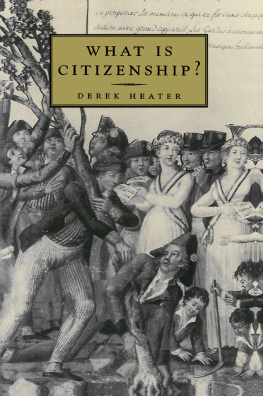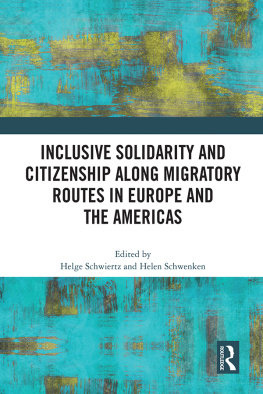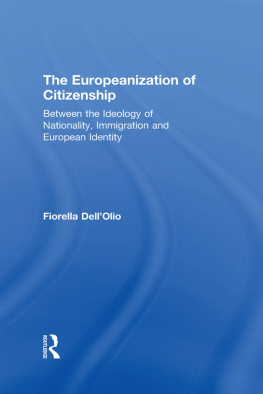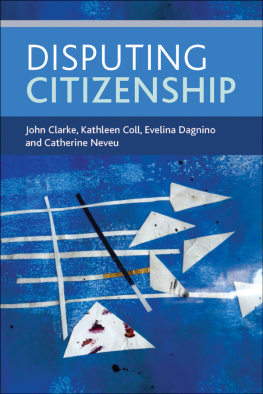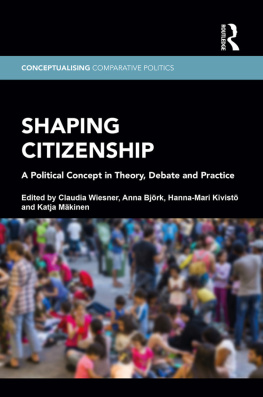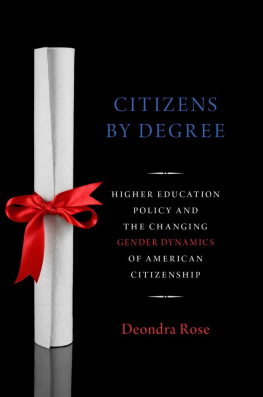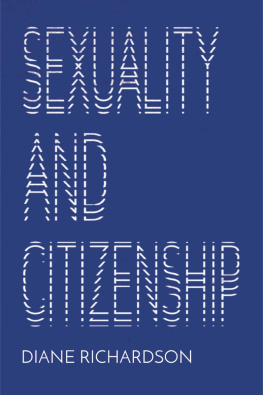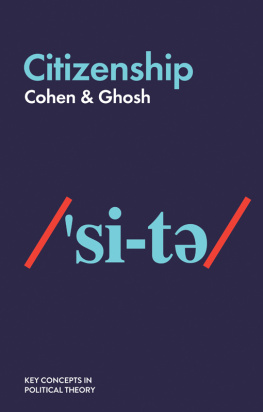Derek Heater - What is Citizenship
Here you can read online Derek Heater - What is Citizenship full text of the book (entire story) in english for free. Download pdf and epub, get meaning, cover and reviews about this ebook. publisher: Wiley, genre: Politics. Description of the work, (preface) as well as reviews are available. Best literature library LitArk.com created for fans of good reading and offers a wide selection of genres:
Romance novel
Science fiction
Adventure
Detective
Science
History
Home and family
Prose
Art
Politics
Computer
Non-fiction
Religion
Business
Children
Humor
Choose a favorite category and find really read worthwhile books. Enjoy immersion in the world of imagination, feel the emotions of the characters or learn something new for yourself, make an fascinating discovery.
- Book:What is Citizenship
- Author:
- Publisher:Wiley
- Genre:
- Rating:3 / 5
- Favourites:Add to favourites
- Your mark:
- 60
- 1
- 2
- 3
- 4
- 5
What is Citizenship: summary, description and annotation
We offer to read an annotation, description, summary or preface (depends on what the author of the book "What is Citizenship" wrote himself). If you haven't found the necessary information about the book — write in the comments, we will try to find it.
Structured analytically, the book introduces the reader to all the facets of citizenship.
What is Citizenship — read online for free the complete book (whole text) full work
Below is the text of the book, divided by pages. System saving the place of the last page read, allows you to conveniently read the book "What is Citizenship" online for free, without having to search again every time where you left off. Put a bookmark, and you can go to the page where you finished reading at any time.
Font size:
Interval:
Bookmark:
What is Citizenship?
DEREK HEATER
Polity Press
Copyright Derek Heater 1999
The right of Derek Heater to be identified as author of this work has been asserted in accordance with the Copyright, Designs and Patents Act 1988.
First published in 1999 by Polity Press in association with Blackwell Publishers Ltd.
Reprinted 2002, 2005, 2008
Polity Press
65 Bridge Street
Cambridge CB2 1UR, UK
Polity Press
350 Main Street
Maiden, MA 02148, USA
All rights reserved. Except for the quotation of short passages for the purposes of criticism and review, no part of this publication may be reproduced, stored in a retrieval system, or transmitted, in any form or by any means, electronic, mechanical, photocopying, recording or otherwise, without the prior permission of the publisher.
Except in the United States of America, this book is sold subject to the condition that it shall not, by way of trade or otherwise, be lent, re-sold, hired out, or otherwise circulated without the publishers prior consent in any form of binding or cover other than that in which it is published and without a similar condition including this condition being imposed on the subsequent purchaser.
ISBN 978-0-7456-2229-3
ISBN 978-0-7456-2230-9 (pbk)
ISBN 978-0-7456-6700-3 (ebook)
A catalogue record for this book is available from the British Library.
Library of Congress Cataloging-in-Publication Data
Heater, Derek Benjamin.
What is citizenship? / Derek Heater.
p. cm.
Includes bibliographical references.
ISBN 978-0-7456-2229-3 ISBN 978-0-7456-2230-9 (pbk)
1. Citizenship. I. Title.
JF801.H433 1999
| 323.6dc21 | 9919927 |
| CIP |
Typeset in 11 on 13pt Adobe Caslon
by Graphicraft Limited, Hong Kong
Printed and bound in the United States by Odyssey Press inc., Gonic, New Hampshire
This book is printed on acid-free paper.
For further information on Polity, visit our website: www.polity.co.uk
Yet another book on citizenship needs to be justified. This is simply done: among the great outpouring of works on the topic during the past decade or so, it is difficult to find a succinct analysis of the subject-matter. David Held recognized the gap, invited me to try to fill it, and he and his colleagues at Polity Press have been of great assistance in seeing the task through to completion. I am also grateful for the comments of two anonymous readers of the manuscript. My wife, too, deserves my usual thanks for uncomplainingly being drawn away from her interest to listen to mine. But, of course, none of these can be thought responsible for the judgements I have made about the content and general approach of the book nor for any errors that it may contain.
I must add two explanations. One is that the book perhaps reflects my own greater interest in the academic disciplines of history and politics rather than sociology, though I have striven to present what I believe to be a reasonable balance. The other is that, although the material is presented in summary form and will, it is hoped, find favour with students, what follows is not just a textbook. I have attempted in places some interpretations by clustering material into patterns, which will add, I trust, both to the understanding of this complicated topic and to its intrinsic interest.
Derek Heater
The author and publisher wish to thank Pluto Press for permission to reproduce extracts from T. H. Marshall and Tom Bottomore, Citizenship and Social Class.
The title of citizen (citoyen, citoyenne) was adopted by the French revolutionaries to pronounce the symbolic reality of equality: the titles of aristocratic distinction were expunged. The Russian revolutionaries went one better by replacing even the title of Mr (gospodin) by the uniform title of citizen (grazhdanin). Today citizenship is a commonly held status throughout the world, though, true, the title has not persisted; so equality, at least in theory, in principle and in law, might seem pervasive. But explaining that equality how it has evolved; its variegated elements, including rights and duties; the civic identity it provides; and how far the practice so often falls short of the theory all this is a much more complicated business than the bland statement of the generalized principle of equality might suggest.
Yet, however difficult the concept of citizenship may be, the effort of comprehension is especially necessary now. For we are at present living through an age that for good reasons considers citizenship of cardinal significance. However, as a consequence of this recognized importance, academic enquiry has uncovered the extraordinary complexity of its history and present condition to aid our more accurate understanding.
There have been other ages of heightened consciousness of citizenship, often associated with particular states. Fifth to fourth-century BC Athens, first-century BC to first-century AD Rome, late medieval Florence, late eighteenth-century America and France spring obviously to mind. The present interest is different: it is virtually global in its extent. How, then, to explain the fascination the subject currently holds? It
derives from the confluence of a number of events and concerns in the 1980s and 1990s.
First, in the established liberal democracies the emergence to political and doctrinal dominance of the New Right in the US and UK threw into question the validity of social citizenship. By social citizenship is meant the provision of welfare state benefits as a right. It is a right that was conceded in order to ensure a greater equality for citizens than would be the case if untempered market forces of employment and wages were allowed to prevail.
Secondly, partly because of accelerated human migrations and partly because of enhanced and politicized awareness of ethnic differences within states, the fact that almost all states are multicultural in demographic composition has become an issue related to the definition of citizenship as civic identity.
Thirdly, and closely related to this development, ethnic, cultural and national consciousness have brought about either the loosening or the actual fragmentation of polities hitherto thought of as nation-states. What does it mean, for example, to be a Canadian citizen if one thinks of oneself primarily as a Qubcois, or an Israeli citizen, if a Palestinian Arab? In potentially fissiparous conditions like these only a stable or strong government could hold a national citizenship in place. In the Soviet Union and Yugoslavia that stability and strength failed; and the assumed nation-states disintegrated. Furthermore, it was a consciousness among a critical mass of the population of the need and the opportunity to claim an effective citizenship that wrought these changes.
But, and moreover, these states had been autocratic regimes, many of whose successor governments sought to rebuild their political systems, this time following the liberal democratic blueprint. And so, fourthly, they have needed to construct fresh constitutions and ways of conducting public life which could give reality to the legal and political rights of citizenship that had not been thoroughly enjoyed under Communism. Nor were the ex-Communist countries alone in striving to make this transition: South Africa and the states of sub-Saharan Africa and Latin America that had endured but shook themselves loose from military dictatorships, have passed through similar experiences of improving the meaning of citizenship for their people.
Fifthly, we are becoming increasingly conscious that for large numbers of people throughout the world the idea of citizenship is still hollow and meaningless, deprived as they are of virtually all its attributes.
Font size:
Interval:
Bookmark:
Similar books «What is Citizenship»
Look at similar books to What is Citizenship. We have selected literature similar in name and meaning in the hope of providing readers with more options to find new, interesting, not yet read works.
Discussion, reviews of the book What is Citizenship and just readers' own opinions. Leave your comments, write what you think about the work, its meaning or the main characters. Specify what exactly you liked and what you didn't like, and why you think so.

